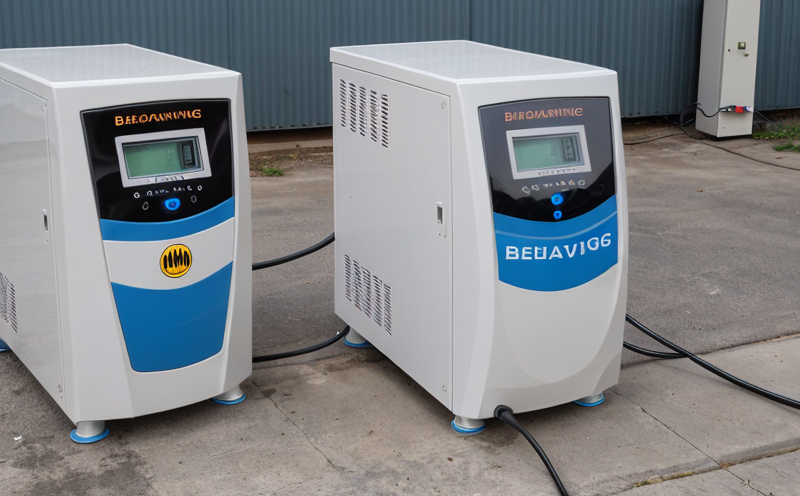ASTM F3149 Charging and Discharging Testing of Lithium-Ion Battery Packs
The ASTM F3149 standard provides a comprehensive framework for the testing of lithium-ion battery packs, focusing specifically on their charging and discharging behavior. This service is critical for ensuring that batteries meet stringent performance criteria and are reliable across various applications.
Lithium-ion batteries power an extensive range of devices from consumer electronics to electric vehicles (EVs). The charging and discharging process is the most significant factor affecting a battery's lifespan, efficiency, and safety. ASTM F3149 helps manufacturers and quality assurance teams verify that their products meet industry standards.
The standard covers various test parameters such as charging rates, discharge currents, cycle counts, and temperature conditions. These tests are designed to simulate real-world operating environments, ensuring the battery's performance under stress conditions. The testing process involves a series of cycles where batteries are charged and discharged repeatedly until they meet defined criteria or reach their end-of-life.
Understanding the charging and discharging behavior is crucial for optimizing battery design and performance. By adhering to ASTM F3149, manufacturers can ensure that their products perform reliably over a wide range of conditions, enhancing user experience and product longevity.
This service supports critical industries such as automotive, consumer electronics, and renewable energy storage systems. Automotive companies, for instance, rely on this testing to ensure the safety and efficiency of EVs. In consumer electronics, it helps maintain the reliability of devices like smartphones and laptops. For renewable energy storage, it ensures that batteries can operate efficiently in varying environmental conditions.
The ASTM F3149 standard is designed to be flexible, allowing for modifications based on specific customer requirements or additional tests as needed. This adaptability makes it a valuable tool for both established manufacturers and startups entering the market.
In summary, ASTM F3149 charging and discharging testing of lithium-ion battery packs provides essential data that ensures product reliability and performance. By adhering to this standard, companies can enhance their products' quality and competitiveness in the global marketplace.
Industry Applications
The ASTM F3149 charging and discharging testing of lithium-ion battery packs has broad applications across multiple industries. In the automotive sector, this service is vital for electric vehicle (EV) manufacturers to ensure that their batteries meet safety and performance standards.
- Automotive: Testing EV batteries to ensure they perform reliably in various driving conditions.
- Consumer Electronics: Ensuring the longevity and efficiency of batteries used in smartphones, laptops, and other devices.
- Renewable Energy Storage Systems: Verifying that storage systems can operate efficiently under diverse environmental conditions.
In addition to these major sectors, ASTM F3149 testing is also beneficial for portable medical devices, drones, and other applications where battery performance is critical. The standard's flexibility allows it to be tailored to the specific needs of each industry, making it a versatile tool across various fields.
Quality and Reliability Assurance
The ASTM F3149 charging and discharging testing ensures that lithium-ion battery packs meet stringent quality and reliability standards. This service plays a pivotal role in maintaining the integrity of battery performance over time, which is essential for both consumer satisfaction and regulatory compliance.
During the testing process, batteries undergo a series of cycles where they are charged and discharged under controlled conditions. This helps identify any potential weaknesses or issues that could affect the battery's lifespan or performance. The results provide valuable insights into the battery's efficiency, capacity retention, and overall reliability.
Quality managers and compliance officers benefit from this service by gaining a clear understanding of how their products perform under various conditions. This knowledge allows them to make informed decisions regarding product improvements and ensure that all products meet regulatory requirements.
The testing process also helps R&D engineers refine battery designs, enhancing performance and durability. By identifying areas for improvement early in the development cycle, engineers can optimize battery performance and extend its useful life.
Competitive Advantage and Market Impact
- Innovation Leadership: Adhering to ASTM F3149 ensures that companies stay at the forefront of industry standards, providing a competitive edge.
- Regulatory Compliance: Meeting these standards guarantees compliance with international regulations, opening up access to global markets.
- User Satisfaction: Reliable battery performance enhances user satisfaction and trust in brand offerings.
- Made-to-Order Solutions: The flexibility of ASTM F3149 allows for tailored testing solutions that meet specific customer requirements, setting companies apart from competitors.





